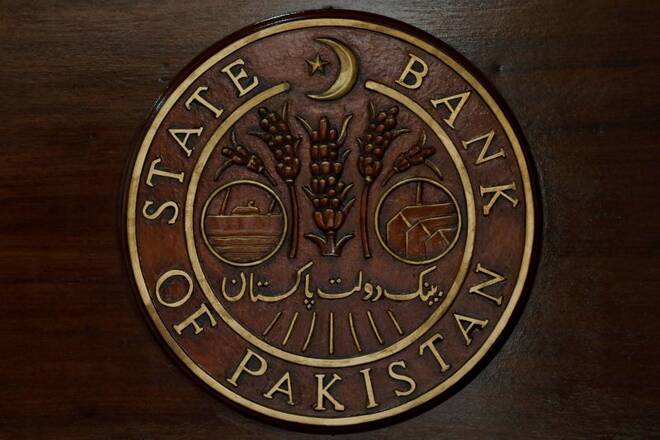Advertisement
Advertisement
Pakistan central bank raises key policy rate by 300 bps to 20%
By:
By Ariba Shahid and Asif Shahzad KARACHI, Pakistan (Reuters) -Pakistan's central bank raised its key interest rate by 300 basis points on Thursday, exceeding investor expectations, as the cash-strapped country attempts to encourage the International Monetary Fund to release critical funding.
By Ariba Shahid and Asif Shahzad
KARACHI, Pakistan (Reuters) -Pakistan’s central bank raised its key interest rate by 300 basis points on Thursday, exceeding investor expectations, as the cash-strapped country seeks to encourage the International Monetary Fund to release critical financing.
The key rate of the State Bank of Pakistan (SBP) now stands at 20%, its highest level since October 1996, with consumer price inflation now at its highest level for almost 50 years. Investors polled by Reuters had expected a rate hike of 200 bps.
“We expect a further 200bps of hikes over the coming months,” Capital Economics said in a note.
The SBP had brought forward its Monetary Policy Committee (MPC) meeting from an original date of March 16, with local media saying the rate hike was a key requirement to get the IMF funding released.
At its last policy meeting in January the bank raised the rate by 100 bps to 17%. It has now put up rates by a total of 1025 bps since January 2022.
“The MPC noted that the recent fiscal adjustments and exchange rate depreciation have led to a significant deterioration in the near-term inflation outlook and a further upward drift in inflation expectations, as reflected in the latest wave of surveys,” the SBP said in a statement.
The SBP sees inflation rising further before it begins to fall. The central bank stated that the average inflation for the year is now expected in the range of 27-29% against the November 2022 projection of 21–23%.
“In this context the MPC emphasised that anchoring inflation expectations is critical and warrants a strong policy response.”
CPI RISES TO 31.5%
Suleman Maniya, head of advisory at Vector Securities, said that while the CPI could potentially increase more with fiscal actions related to subsidy removals and exchange rate weakness, the government needed to urgently focus on improving the supply side, especially of food and agricultural items.
For its part, the government is trying to cut expenditure and increase revenue through taxes, and has allowed the rupee to depreciate.
Pakistan’s consumer price index (CPI) jumped 31.5% in February year-on-year as food, beverage and transportation prices surged more than 45%.
As per the ninth review of a previous deal with the IMF, the global lender is due to release a tranche of over $1 billion to Pakistan.
Pakistan’s central bank foreign exchange reserves stood at $3.814 billion as of Thursday, the state bank said in a statement, up from the previous week.
“…Scheduled debt repayments and a decline in financial inflows amid rising global interest rates and domestic uncertainties continue to exert pressure on FX reserves and the exchange rate,” it said its policy rate statement.
It added that FX reserves remain low and concerted efforts are needed to improve the external position.
The Pakistani rupee slumped nearly 6% against the U.S. dollar on Thursday with no clarity on the IMF fund release.
“Today’s slide in the rupee and policy rate hike can be seen as a step towards unlocking the next tranche from the IMF,” said Saad Rafi, head of equities at Al Habib Capital Markets.
The MPC also decided to hold its next meeting on April 4, rather than the previously scheduled April 27.
(Reporting by Ariba Shahid in Karachi, and Asif Shahzad in IslamabadEditing by Gareth Jones, Chizu Nomiyama and Mark Heinrich)
About the Author
Reuterscontributor
Reuters, the news and media division of Thomson Reuters, is the world’s largest international multimedia news provider reaching more than one billion people every day. Reuters provides trusted business, financial, national, and international news to professionals via Thomson Reuters desktops, the world's media organizations, and directly to consumers at Reuters.com and via Reuters TV. Learn more about Thomson Reuters products:
Did you find this article useful?
Latest news and analysis
Advertisement
